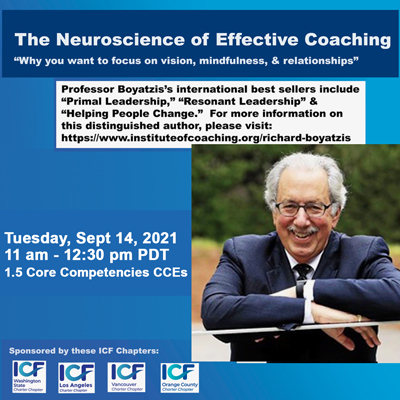
- This event has passed.
ICF Pacific Chapters present: The Neuroscience of Effective Coaching
September 14, 2021 @ 11:00 am - 12:30 pm
$15.00 – $25.00
Topic: The Neuroscience of Effective Coaching
Speaker: Richard Boyatzis, PH. D.
CCE’s: 1.5 Core Competencies
Date: Tuesday, September 14, 2021
Time: 11:00 AM – 12:30 PM Pacific Time
Location: Virtual meeting via Zoom.us / Your link to join the conference will be sent after you register.
NOTE: This event was previously scheduled for Tuesday, September 7th, and changed to honor the Rosh Hashanah holiday.
Description
You’re trying to help others change – but is it working?
Helping others is a good thing. Often, as a leader, manager, teacher, or coach, it’s central to your job. But even the most well-intentioned efforts to help others can be undermined by a simple truth: We almost always focus on trying to “fix” people, correcting problems, or filling the gaps between where they are and where we think they should be. Unfortunately, this doesn’t work well, if at all, to inspire sustained learning or positive change. There’s a better way. In this powerful, practical presentation, emotional intelligence expert Richard Boyatzis introduces a clear way to help someone learn and change while connecting to that person’s positive vision of themselves or an inspiring dream or goal they’ve long held. This is what great coaches do–they know that people draw energy from their visions and dreams, and that same energy sustains their efforts to change, even through difficult times.
The latest research in neuroscience is helping us understand the mechanisms of how various forms of coaching affect a person’s openness to new ideas, change, and learning. In a series of fMRI studies, coaching toward vision and high quality relationships, called coaching with compassion, is distinctively effective at activating the appropriate neural networks. The opposite effect, when engaged in problem-focused coaching, called coaching for compliance, does the opposite. Really, it activates the opposite to what is needed and wanted! The key appears to be a focus on the future and that the coach and client are literally in tune with each other. Their own level of emotional intelligence allows the coach to create and nurture these resonant relationships. They use their EI on the path through mindfulness, hope, compassion, and playfulness.
These experiences of mindfulness, hope, compassion, and playfulness are essential to renewal of the human organism at the neurological, hormonal, emotional, and behavioral levels. Based on decades of research into longitudinal studies of coaching the development of emotional and social intelligence competencies, Professor Richard Boyatzis will lead the audience through examples of how true, evidence-based coaching with compassion (i.e., coaching a person to the PEA, their vision and values) is key to development and more resonant relationships. He will describe his recent fMRI studies on coaching to the Positive Emotional Attractor (PEA) versus the Negative Emotional Attractor (NEA), as well as recent doctor-patient studies showing that arousal of the PEA increased treatment adherence for Type II Diabetics. He will explain why it is central to neuro-endocrine renewal in the human body (which is the only antidote to the ravages of chronic stress).
This session will address the following:
1. A process for developing sustainable improvement on EI, resonant relationships, and the central role of compassion in it.
2. Understanding the psycho-physiological role of the Positive Emotional Attractor and the Negative Emotional Attractor in motivating change or encouraging the status quo regression.
3. Perceiving how coaching with compassion is effective in helping people change in sustainable ways, but coaching for compliance is not. And why it is crucial to the sustainability of the leader (i.e., the coach) as well.
4. Understanding the neural activations involved in these two forms of coaching and why one prepares a person to consider change and learning and the other closes their minds.
5. How to coach others to develop EI, resonant leadership, and to sustainably change.
More about Dr. Richard Boyatzis
Richard E. Boyatzis is Distinguished University Professor of Case Western Reserve University, Professor in the Departments of Organizational Behavior, Psychology, and Cognitive Science, and HR Horvitz Professor of Family Business. He has a BS in Aeronautics and Astronautics from MIT, a MS and Ph.D. in Social Psychology from Harvard University. Using his Intentional Change Theory (ICT), he studies sustained, desired change of individuals, teams, organizations, communities, and countries since 1967. He is the author of more than 200 articles and 9 books on leadership, competencies, emotional intelligence, competency development, coaching, neuroscience, and management education, including the international best-seller, Primal Leadership with Daniel Goleman and Annie McKee and the recent Helping People Change with Melvin Smith and Ellen Van Oosten. His Coursera MOOCs, including Inspiring Leadership Through Emotional Intelligence, have over a million enrolled from 215 countries. He is a Fellow of the Association of Psychological Science, the Society of Industrial and Organizational Psychology, and the American Psychological Association.
